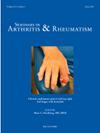Recommendations issued by clinical practice guidelines for the implementation of healthy lifestyles in adult patients diagnosed with gout: a scoping review
IF 4.4
2区 医学
Q1 RHEUMATOLOGY
引用次数: 0
Abstract
Background and Objectives: Gout is the most common inflammatory arthritis and is closely related to hyperuricemia. Although pharmacological treatment is key, lifestyle changes can help in its prevention and control. This study identified the recommendations of Clinical Practice Guidelines (CPG) on healthy habits in adults with gout and the methodology used in their development.
Methods: A scoping review of CPGs published in the last 5 years in databases such as PubMed, Scopus and Web of Science, as well as repositories specialized in clinical guidelines, was performed. The PRISMA-ScR guidelines and the JBI methodology were applied.
Results: Nine CPGs with recommendations on diet, physical activity and alcohol consumption were identified, with differences in their approach and level of evidence. Seven CPGs used GRADE to assess the quality of evidence and two used OXFORD. Most recommend reducing consumption of foods rich in purines and fructose, moderating alcohol, and promoting weight loss in overweight patients. No specific mental health recommendations were found. Conclusions: Lifestyle recommendations in gout CPGs, though they have a useful complementary role to play, are limited, and lack consensus. More rigorous research and updated guidelines are needed to improve patients' quality of life.

临床实践指南对成年痛风患者实施健康生活方式的建议:范围审查
背景与目的:痛风是最常见的炎症性关节炎,与高尿酸血症密切相关。虽然药物治疗是关键,但生活方式的改变也有助于预防和控制该病。本研究确定了临床实践指南(CPG)对成人痛风患者健康习惯的建议以及在其发展过程中使用的方法。方法:对近5年在PubMed、Scopus、Web of Science等数据库以及临床指南知识库中发表的cpg进行范围综述。采用PRISMA-ScR指南和JBI方法。结果:确定了9个cpg,建议饮食、体育活动和饮酒,其方法和证据水平存在差异。7个cpg使用GRADE来评估证据质量,2个使用OXFORD。大多数人建议减少摄入富含嘌呤和果糖的食物,适量饮酒,并促进超重患者减肥。没有发现具体的心理健康建议。结论:痛风cpg的生活方式建议,虽然有有益的补充作用,但是有限的,缺乏共识。需要更严格的研究和更新的指导方针来改善患者的生活质量。
本文章由计算机程序翻译,如有差异,请以英文原文为准。
求助全文
约1分钟内获得全文
求助全文
来源期刊
CiteScore
9.20
自引率
4.00%
发文量
176
审稿时长
46 days
期刊介绍:
Seminars in Arthritis and Rheumatism provides access to the highest-quality clinical, therapeutic and translational research about arthritis, rheumatology and musculoskeletal disorders that affect the joints and connective tissue. Each bimonthly issue includes articles giving you the latest diagnostic criteria, consensus statements, systematic reviews and meta-analyses as well as clinical and translational research studies. Read this journal for the latest groundbreaking research and to gain insights from scientists and clinicians on the management and treatment of musculoskeletal and autoimmune rheumatologic diseases. The journal is of interest to rheumatologists, orthopedic surgeons, internal medicine physicians, immunologists and specialists in bone and mineral metabolism.

 求助内容:
求助内容: 应助结果提醒方式:
应助结果提醒方式:


